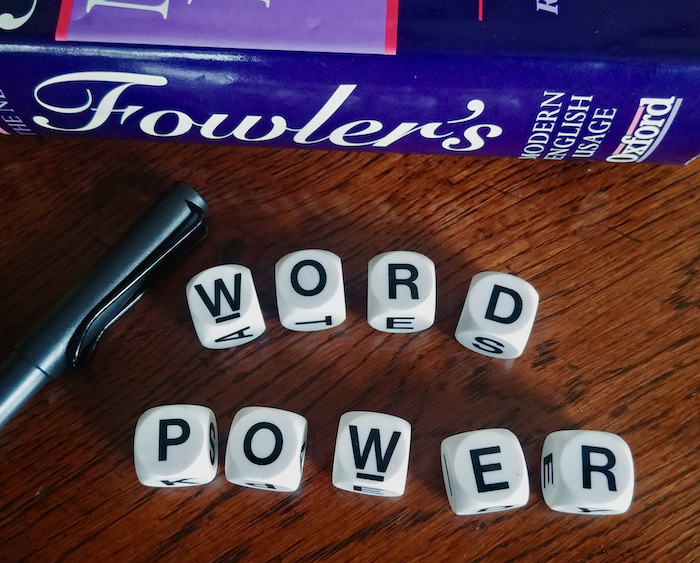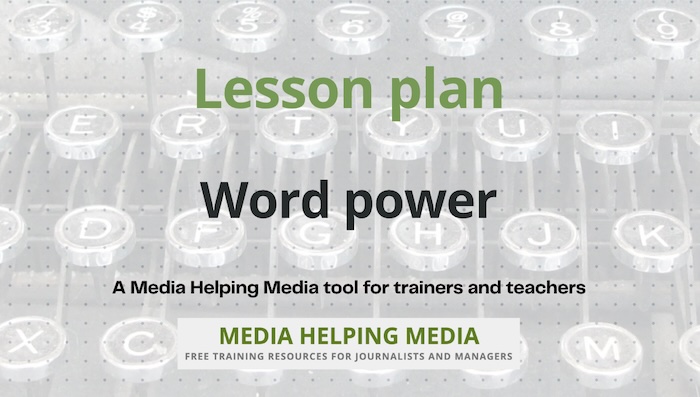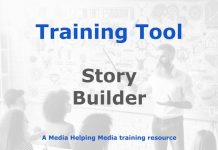
Basic literacy is a core element of the job of a journalist. Words are powerful and they need to be used properly.
Words are classified according to the job they do in a sentence.
Word classifications
The following are the most important word classifications that journalists will use in their work. It is important to understand their role in sentence construction:
- Noun
- Common nouns are naming words (editor, television, albatross).They can be singular or plural.
- Proper noun
- Proper nouns are names which usually start with a capital letter (Denmark, Mars, Angela). Nouns which refer to collections of people and things are called collective nouns (the team, the Cabinet).
- Verb
- Verbs express action or a state of being (write, hit, be).
- Pronoun
- Pronouns take the place of nouns (he, her, we, them).
- Adjective
- An adjective is a describing word (Welsh, big, blue).
- Adverb
- An adverb describes a verb or adjective (clearly, gracefully, finally, suddenly).
- Preposition
- Prepositions are the little words which hold a sentence together, often by showing direction or location (in, to, from, by, with, beyond).
Word usage basics
The first rule of writing is to know what you want to say. This may seem a statement of the obvious, but items are often broadcast and published which are not exactly what the writer intended
“For the second time in six months, a prisoner at Durham jail has died in his cell.”
The ability of some people to die more than once is also illustrated in this headline:
“A suicide bomber has struck again in Jerusalem.”
The key to good writing is simple thoughts simply expressed. Use short sentences and short words. Anything which is confused, complicated, poorly written or capable of being misunderstood risks losing the listener, viewer, or reader, and once you have done that, you might just as well not have come to work.
In broadcasting, the basic sentence structure Subject-Verb-Object works every time. The
audience grasps what you are saying straight away. Anything more flamboyant, such as a subordinate clause, is a potential barrier to understanding.
- Do not describe news as good, bad, shocking or horrendous. Tell the story and let the listener/reader decide.
- Do try to get a strong active verb in the first sentence. You want to make an impact and keep people listening.
- Do not start a news report with a question. The audience wants to be informed, not take part in a quiz.
- Do not begin a story with “As expected…‘ If your item was predictable and you have nothing new to say, why should the listener or viewer pay attention?
- Be positive. Make assertions wherever possible, and try to avoid negatives. It is more direct to say “The plan failed” than “The plan was not successful“.
The most interesting writing often involves creating something unexpected, and rules tend to get in the way, but daily journalism has its discipline that should be observed.
Frequently confused words
English is full of traps for the unwary. Words which sound similar can mean very different things. The audience expect the right words to be used.
Consider these examples:
“A boy of twelve is in intensive care in hospital after a group of teenagers doused him in inflammatory liquid and then threw a lighted match at him.”
The writer did not mean this. She meant inflammable, capable of being set on fire, not inflammatory, tending to stir up trouble.
The writer of the sentence below also chose the wrong word.
“The union’s decision will mitigate against a settlement.“
The word required was militate, working against. Mitigate means to appease, to soften, as in mitigating circumstances, which means circumstances that reduce the seriousness of an offence.
Here is a list of frequently confused words. If you are not confident about their meanings, look them up. If you want a longer list, along with definitions, see our article ‘Frequently confused words‘.
- Affect/effect
- Alternate/alternative
- Appraise/apprise
- Biannual/biennial
- Continual/continuous
- Dependent/dependant
- Discreet/discrete
- Disinterested/uninterested
- Distinctive/distinguished
- Flounder/founder
- Flout/flaunt
- Fortuitous/fortunate
- Inflammable/inflammatory
- Loathe/loath/loth
- Luxuriant/luxurious
- Meter/metre
- Militate/mitigate
- Peddle/pedal
- Practical/practicable
- Principle/principal
- Refute/rebut
- Regretful/regrettable
- Repel/repulse
- Resistant/resilient
- Stationary/stationery
- Titivate/titillate
Confusing sentence structure
There are some topics which seem to have an inexhaustible ability to cause confusion and sow doubt in people’s minds.
Fewer and less
Fewer means not as many, less means not as much. A commonly quoted example used to highlight the distinction is “There are fewer cars on the road”, which means there is less traffic.
These two sentences offer another useful reminder of the difference:
“The fewer people know about this the better.”
“The less people know about this the better.”
The rule does not work if the number is counted as a quantity or as a unit.
“She paid less than ten pounds for it.”
“His last jump was less than fifteen feet.”
Over and more than
Over refers to height, more than refers to quantity.
Consider these sentences:
“Over 10,000 people attended the first day of the festival.”
“More than 10,000 people attended the first day of the festival.”
The second sentence is correct.
That and which
This is not something to get too concerned about. It is not right to suggest that which is somehow grander than that, and on many occasions you can miss out the pronoun altogether, as “The car she was driving”, or “This is the outfit I’ll be wearing tonight“.
When you do use it, a useful guide is that defines, which informs. This is not a cast iron rule but it can help:
“This is the house that Jack built, but I think the one next door, which Jack also built, is more attractive.”
This is another example which illustrates the point:
“The police stopped the second car that was driven by a woman.”
“The police stopped the second car, which was driven by a woman.”
Split infinitive
There is no grammatical rule which says you cannot split an infinitive, but there are people who get almost upset if they hear one.
Sometimes, it is definitely better to split:
“Can dot.com companies ever hope to fully recover their share values?”
This sounds much better than moving fully in front of to recover or behind it. The main consideration is not to write anything which is ambiguous or inelegant.
May or might
The difference between these two words is gradually being eroded and there are many occasions now when they are quite interchangeable.
They offer varying and subtle degrees of certainty.
“The governor might resign” – suggests a possibility.
“The governor may resign” – indicates a little more probability.
May have and might have cause even more difficulty.
“We may have beaten Australia” suggests a lack of knowledge; perhaps we did, perhaps we didn’t, I’m not sure.
“We might have beaten Australia” suggests that if things had been different (wetter, drier, breezier), if that disputed try had been given, or if our forwards had been a little more effective, there was a chance that victory could have been ours.
Superlatives
If you are ever tempted to use a superlative, think about it. Are you absolutely confident that you are right? The audience is an enormous reservoir of information, and it does your reputation no good if you write about things which are incorrect.
Do not try to add impact to your stories by using superlatives you cannot justify, so make sure of your facts before you use words such as:
- exceptional
- exclusive
- fastest
- first
- greatest
- heaviest
- inimitable
- irreplaceable
- largest
- last
- least
- longest
- matchless
- most
- only
- record
- slowest
- smallest
- sole
- tallest
- unique
- unmatched
- unprecedented
If possible, it is best to attribute claims: “A Bridlington man has made what he says is the world’s biggest model of the Empire State Building using only matchsticks”.
If he is challenged, he can slug it out with the competition.
Simple words
Simplicity is the central to understanding. Short words in short sentences present listeners, viewers, and readers with the fewest obstacles to comprehension.
In many cases there are longer, more decorative alternatives but think twice before you use them. They take up more time and they can give the audience more to think about.
Here are some examples:
- approximately = about
- apprehend = catch
- ameliorate = improve
- ascertain = learn
- assistance = help
- attempt = try
- commence = start
- exceedingly = very
- discontinue = stop
- magnitude = size
- manufacture = make
- numerous = many
- possesses = has
- purchase = buy
- remuneration = pay
- requested = asked
- residence = home
- subsequently = later
- terminate = end
- utilise = use
Troublesome words
Some words are often misused. Using the wrong word detracts from your journalism, and prevents you from saying what you really wanted to say. Here are some words to look
out for:
- Anticipate and expect are thought by some people to be interchangeable, but that takes away a useful distinction. If I am playing chess and I anticipate my opponent’s next move, I see it coming and act accordingly. There is action as well as expectation. So if you think Liverpool will beat Manchester United, say you expect a Liverpool victory rather than anticipate one. It is simpler and more direct.
- Assassination should be kept for the violent deaths of royalty and seriously prominent members of society, such as political or religious leaders. Everyone else is murdered or killed.
- Cohort originally meant the tenth part of a Roman legion, and when statisticians use it, they mean a group with a shared characteristic. Despite recent American usage, it does not mean a group of colleagues, cronies, friends, Romans or countrymen.
- Crescendo is a gradual increase culminating in a climax, so it is wrong to say that something rose to a crescendo.The word you want is climax.
- Decimate originally meant to kill every tenth person but is now often used to indicate the destruction of a large part of something. Devastate or destroy are just as good.
- Disinterested means impartial; uninterested means not interested in.
- Draconian is much overused, usually by people with no idea who Draco was. (If asked, say he was an Athenian judge who ruled that the penalty for almost everything should be death.) Try severe or harsh instead.
- Effectively is often confused with in effect. If something is effective, it produces a satisfactory result, so effectively means with a satisfactory outcome. “The outbreak of plague in Birmingham has been effectively contained” means the rest of us are safe. In effect means in practice, and often indicates an unplanned outcome, as in “The new tax has in effect made it more sensible for Jane to remain on benefits”.
- Electrocution means death by electric shock. As such, it is always fatal.
- Enormity does not mean large size. It means great wickedness or outrage, although the correct usage seems to be under attack from all sides.
- Evacuate The rule used to be that only places or buildings were evacuated, not people (unless they had been given an enema). This is at odds with common usage so let the people be evacuated.
- Execute means to put to death after a legal process. Terrorists or criminals do not execute people, they murder them.
- Fatwa is often misused. It is a formal legal opinion handed down by a Muslim religious leader or court. It may or may not be a death sentence.
- Forensic does not mean scientific. It means belonging to courts of law, so a forensic expert knows a lot about the legal process. Forensic scientists produce evidence that might be useful in court cases. Avoid forensic tests; you probably mean scientific tests.
- Fulsome is not a close relative of full, and does not mean generous. It means gushing, cloying, effusive or sickeningly fawning. If that’s how to want to describe a speech or tribute, then this is the word for you.
- Go missing is inelegant and unpopular with many people, but its use is widespread. There are no easy synonyms. Disappear and vanish do not convince and they suggest dematerialisation, which is rare.
- Historic is a popular word with journalists. It is nice to think that the events we are describing will resonate down the decades, but who are we to judge? Use with great care, and never confuse with historical, which means belonging to history.
- Hopefully generates much heat in some quarters. It certainly means in a hopeful manner, as in “It is better to travel hopefully than to arrive”, but it is now generally also used to mean it is to be hoped that, as in “Hopefully there will be an improved train service to London”. There is no confusion, so it can justifiably be used in both senses.
- Immolate is not another word for burn. It means to sacrifice or give up something in exchange for something else.
- Infer does not mean the same as imply. If I imply (suggest indirectly) that my programme has an interview with Elvis Presley, and you believe me, you infer (come to the conclusion) that we have the greatest showbiz scoop of all time. Put simply, the inference follows the implication.
- Innocent bystanders and their close friends perfect strangers should not be in your contacts book.
- Ironically does not mean by an odd coincidence. Irony is using words to say the opposite of what they literally mean, and something is ironic if it is the opposite of what might have been expected. It is a subtle concept and is probably best avoided.
- Major is so overused as to be almost meaningless. Think at least twice before you write major operation, major speech, major incident or major changes.
- Massive is regularly misused.As the word implies, it concerns mass, weight and bulk, not quantity.
- Momentarily properly means for a moment, not in a moment, but its misuse is common. If the aircraft pilot says he’ll be landing momentarily, does he mean the plane will touch the ground briefly and then take off again? Probably not.Try to be one of those who uses it correctly.
- Near miss is understood by everyone, even though some people argue that near collision is more accurate. Think of it as shorthand for a miss that came very near to being a collision.
- Refute has a particular meaning. To refute a statement means to prove it wrong. So do not write “The Chancellor refuted opposition claims that he had mishandled the economy”, because it is very unlikely that he did so. Refute is not a synonym for deny, disagree or contradict.
- Surrogate means substitute, so it is the mother who is a surrogate, not the baby.
- Transpire means to come to light or become known, as in “It transpired that the editor had been to school with his secretary’s brother”. It does not mean happen or occur.
- Unique has a unique meaning, and it is that there is only one of something (uni as in unicycle, unicorn or unisex). Nothing can be almost unique. You should be saying distinctive or unusual.
- Viable gets knocked around by many journalists and is often misused. It does not mean workable or feasible, but capable of living and surviving, capable of normal growth and development. If a foetus is not viable it means it cannot survive outside the womb.
Other words are a problem because they are tendentious. For example:
- Ethnic cleansing. This apparently inoffensive term covers a multitude of sins, including massacres, murders, concentration camps, and the forced removal of people from their homes. Not to be used lightly.
- Pro-life is used in the United States to denote the lobby which opposes abortion. In the UK, there is an implication that if you are not pro-life then you are anti-life or pro-death. Avoid this moral minefield by using anti-abortion.
- Reform can also cause problems because it carries a suggestion of improvement, of making things better. When politicians call for the reform of the health service, local government, or the police force, there is no guarantee that their proposals will be positively received by the people directly involved. One man’s reform is another man’s misguided, ill conceived, impractical, vindictive political interference.
- Modernisation is another word to be wary of. It can be used to mask a lot of unpleasant things like job losses, changes in working practices, and getting employees to do more for less. But there’s just a chance it can also mean improved working conditions, new equipment or premises, more flexible hours and a better life for everyone.
Vogue words
There is fashion in language as in most things, and some words are suddenly everywhere. Islamist is regularly used as a synonym for Muslim and seems set to have a long and happy life in stories about terrorism and the threat posed by terrorists.
A raft used to mean a flat structure made up of planks or logs tied together so they formed a floating platform, but journalists and politicians have seized on it as a synonym for a lot of, and they are doing it to death.
- “We are putting together a raft of measures to tackle homelessness.”
- “The bill has attracted a raft of amendments.”
- “The government has unveiled a sweeping raft of proposals.”
What is a sweeping raft? When was the last time you heard someone in the pub say I must get home. I’ve got a raft of ironing to do?
Another word much loved by politicians, diplomats and journalists is broker. Again, do you hear people saying We have brokered a good price for our house? They would be much more likely to say negotiated.
Some people use vogue words because they think it shows they are clever and up with the times. Others believe it demonstrates a lack of original thought and individuality.
Good writers will try to avoid vogue words because they know everyone else is using them.
Here is a brief list of words and phrases. None of them is banned, and nor should they be, but you should approach them with care.
- asymmetrical
- caring
- dichotomy
- ecosystem
- epicentre
- eponymous
- exponential
- fashionista
- infrastructure
- interface
- kickstart
- leading edge
- lifestyle
- meaningful
- overarching
- parameter
- pivotal
- quantum leap
- scenario
- step change
- surgical strike
- synergy
- take on board
- traumatic
- underpin
- warfare
Superfluous words and phrases
English is full of groups of words which go round together filling up sentences. We know them and we are comfortable with them.
But if you want to be concise and clear in your writing you might want to discard them. Here are some examples:
- At this moment in time = now
- By virtue of the fact that = because
- In the absence of = without
- Made good their escape = escaped
- Leaves much to be desired = poor
- Was of the opinion that = thought
- Put in an appearance = appeared
- On account of the fact that = because
- In conjunction with = and
- A large proportion of = many
- Placed under arrest = arrested
- In the event that = if
- With the exception of = except
There are lots more, and none of them should earn a place in your text.
Another way to save time is to be aware of words which go together but actually mean the same thing.
For example, an added bonus does not need the word added because by definition a bonus is something additional.
An aircraft need not plummet down to earth because plummet means falling down. Nothing plummets in any direction other than down.
Here are some more repeater phrases. You can add your own examples.
- New innovation = innovation
- Surrounded on all sides = surrounded
- Red in colour = red
- Razed to the ground = razed
- Exactly the same the = same
- Close proximity = close
- Free gift = gift
- In the field of biology = in biology
- Collaborate together = collaborate
- Temporary reprieve = reprieve
- Consensus of opinion = consensus
- Personal opinion = opinion
- Oblong in shape = oblong
- Future plans = plans
- Close scrutiny = scrutiny
- Minute detail = detail
- Shorter in length = shorter
- Prior experience = experience
- Combine together = combine
- Revert back = revert
- Patently obvious = obvious
- Exact replica = replica
By John Allen
The original text for this article first appeared in a BBC Style Guide. The BBC gave Media Helping Media permission to rework this material and publish it.
 Questions
Questions
- What is the primary role of a noun in a sentence?
- How do proper nouns differ from common nouns?
- Define the term “collective noun” and provide an example.
- Explain the difference between “mitigate” and “militate“.
- Why is it important for journalists to use short sentences and simple words?
- Analyse the sentence structure of “The plan failed” and explain why it is preferred over “The plan was not successful.”
- Discuss the significance of using active verbs in the first sentence of a news report.
- Evaluate the use of the word “unique” in journalism and explain why it should be used cautiously.
- Synthesise the guidelines provided in the text for avoiding confusing sentence structures.
- How does the text suggest journalists handle the use of superlatives in their writing?
Answers
- A noun primarily serves as a naming word in a sentence, identifying people, places, things, or ideas.
- Proper nouns are specific names that usually start with a capital letter, while common nouns are general names for a class of objects or concepts.
- A collective noun refers to a group of individuals or things considered as a single entity. An example from the text is “the team.”
- “Mitigate” means to make less severe or to appease, while “militate” means to work against or hinder.
- Short sentences and simple words help ensure clarity and prevent misunderstanding, keeping the audience engaged and informed.
- “The plan failed” is direct and assertive, making it clearer and more impactful than the passive and less direct “The plan was not successful.”
- Active verbs in the first sentence create impact and engage the audience immediately, encouraging them to continue reading or listening.
- “Unique” should be used cautiously because it implies that something is one of a kind, and misuse can lead to inaccuracies or exaggerations.
- The text suggests avoiding complex structures such as subordinate clauses and using clear, direct language to prevent confusion.
- Journalists should ensure they can justify the use of superlatives with facts, as incorrect use can damage credibility and mislead the audience.
Lesson plan for trainers
If you are a trainer of journalists we have a free lesson plan: ‘Word power‘ which you are welcome to download and adapt for your own purposes.
Related article
We have another article covering this topic which you might want to read.










